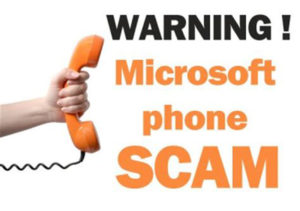Paul Derengowski, Ph.D.
 A couple of days ago an individual with a heavy foreign accent (“Edward Stevens”) called me, claiming to be a Microsoft Security person, here in Fort Worth, no less. According to him, I had malware on my computer and that it was necessary for me to take the proper measures to get rid of it.
A couple of days ago an individual with a heavy foreign accent (“Edward Stevens”) called me, claiming to be a Microsoft Security person, here in Fort Worth, no less. According to him, I had malware on my computer and that it was necessary for me to take the proper measures to get rid of it.
So, I played along with him—more like, strung him along—as he gave me instructions on what needed to occur to secure my computer. He told me that I had to remove certain files, which did not make sense, given that I told him that Microsoft had just updated my files the day before.
What few people do not understand is that scammers, like this one, want control of their computer, which includes their personal data and financial information, as well as remote function. They do this by first having the victim remove vital security files and then replace them with Trojan horse programs (the real malware). Often this leads to holding the computer and owner hostage until further payment is made.
So, instead of removing anything from my computer or allowing him access, that is when I went into Q&A mode. Scammers, thieves, liars, and crooks hate it when you start asking questions that catches them in their deceit. Of course, it is only certain questions that they cannot answer without blowing their cover that annoys them the most.
After about 25 minutes, the scammer made his biggest blunder by giving me his address, which I was ready with Google maps to pull up his location. But, as has always been the case with previous scammers, his address was bogus. When he claimed the house on my screen was his place of employment, which was nonsense, since the address did not actually exist, that is when he started to backpedal. When I asked him how late he was working, so I could stop by, that is when he hung up. He has not called back since.
A caveat to the reader, though, is in order. First, do not mess with a scammer, unless you know what you are doing. Many of them are just like those in the cults. They have their own lingo and pitch, that if you are not careful, you could easily become victimized.
Second, keep in mind that no reputable computer company will call you unsolicited. Unless you initiate the call, then do not automatically assume that whomever from wherever (Microsoft, Apple, HP, Dell or whomever) is who they claim to be. They are not!
Third, as the scammer starts to feel comfortable thinking that he/she is getting somewhere with you, try to gather information that law enforcement would find useful to shut the scammer’s operation down. Names. Places. Phone numbers. Most of it will be bald-face lies, but some of it will be useful.
Lastly, if you become bored, intimidated, or have just enough laughs, hang up. Do not be the fool in this situation, but answer the fool as his folly deserves, lest you become like him (Prov. 26:4-5). Remember, these are devious people out to steal your livelihood. Typically, once you have asked enough questions or have made it obvious to them that they need to run, they will. But, if that does not happen, get your information, hang up, and then call your local law enforcement.




